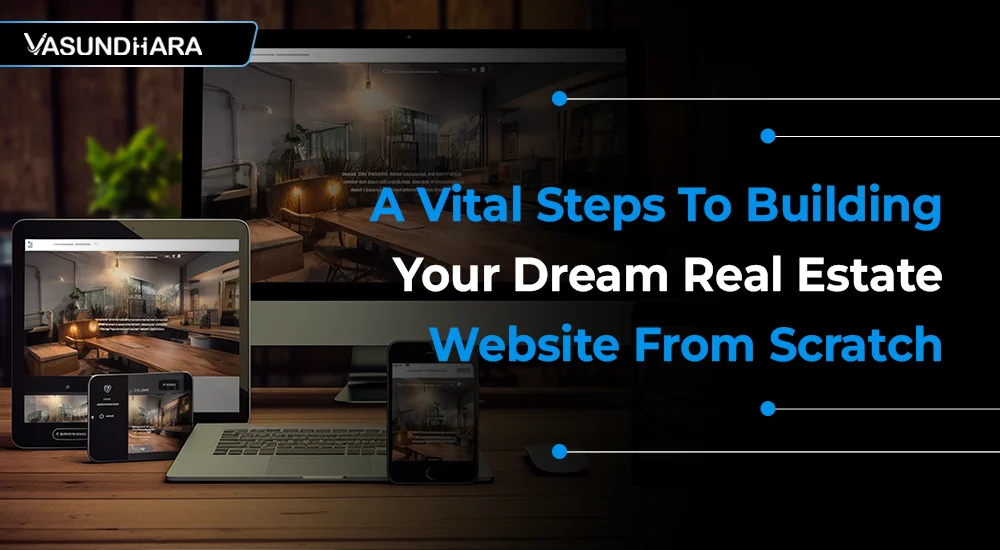Creating an efficient and user-friendly real estate website is crucial for any real estate business in today's digital age.
A well-designed website can help attract potential buyers and sellers, showcase your listings, and establish your brand.
This ultimate guide will walk you through the critical steps on how to build a real estate website from start to finish.
1. Market Stats of Real Estate Industry
Here are some statistics about the real estate web development market that show how demand is growing.
According to estimates, India's real estate market will be worth USD 265.18 billion in 2023 and USD 828.75 billion in 2028, rising at a CAGR of 25.60% over the projected period (2023-2028).
The market is dominated by residential real estate, with a forecast market volume of US$498.60tn in 2023
70% of broker/broker associates and 69% of sales agents have a website.
2. Best Real Estate Websites in 2023
We have collected a list of the most popular real estate websites that you should visit before consulting a professional for the building of a real estate website.
Zillow is the most prominent real estate website on the web, and it also claims to have the most listings.
The website can be used for all real estate-related activities, including purchasing, selling, renting, financing, and remodeling.
Therefore, if you wish to create a website similar to Zillow for your business, you must consult with a web development company or employ real estate web developers.
Realtor.com is a well-known real estate website that gives buyers, owners, and renters all the information and tools they need to buy, sell, or rent a home.
Realtor.com has become a trusted platform in the real estate business because it is easy to use and has a large database.
Homes.com is one of the finest real estate websites that the majority of people use.
It helps users in their nationwide searches for houses, condos, apartments, and other types of real estate.
3. Things To Consider While Creating An Effective Real Estate Website
Creating an efficient real estate website involves several vital steps to ensure that it effectively showcases properties, provides a user-friendly experience, and generates leads.
Here's a step-by-step guide to help you get started:
Identify your target audience: Determine whether you target buyers, sellers, renters, or real estate professionals.
Analyze competitors:Research other real estate websites to understand what features and functionalities are commonly used and how you can differentiate your website.
Define goals:Clearly outline the purpose of your website, whether it's to showcase listings, provide market information, offer resources, or facilitate transactions.
- Choose a Domain and Hosting
Select a memorable and relevant domain name that reflects your real estate brand.
Choose a reliable web hosting provider with good speed, uptime, and scalability for traffic growth.
Decide whether to use a website builder like WordPress with real estate themes/plugins or if you want a custom-built solution.
Opt for a platform that provides flexibility, customization options, and good SEO capabilities.
- Design and User Experience
Choose a clean and professional design that aligns with your brand's identity.
Ensure a responsive design that works well on various devices and screen sizes.
Implement intuitive navigation and a user-friendly interface to enhance user experience.
Develop a user-friendly property listing system with search and filter options.
Include high-quality images, detailed property descriptions, pricing, location, and other relevant information.
Consider implementing a map feature to show property locations accurately.
Create individual property pages with all essential information.
If possible, include interactive features like image galleries, virtual tours, and 360-degree views.
Provide clear calls-to-action (CTAs) for inquiries, scheduling viewings, or contacting agents.
- Advanced Search and Filtering
Implement advanced search options, such as filtering by location, property type, price range, amenities, and more.
Ensure the search functionality is fast, accurate, and easy to use.
If applicable, create profiles for real estate agents with their photos, contact information, specialities, and reviews.
Allow users to contact agents through the website directly.
Integrate a mortgage calculator to help users estimate costs.
Provide a blog or resources section with valuable real estate-related content.
Include social sharing buttons for users to share listings easily.
- Optimization and Performance
Optimize images and content for fast loading times.
Implement SEO best practices to improve search engine visibility.
Regularly monitor and optimize website speed and performance.
Implement SSL encryption to secure user data and improve trust.
Ensure compliance with data protection regulations, especially when handling user information.
Thoroughly test the website on different browsers and devices to ensure consistent functionality and design.
Gather feedback from potential users to identify usability issues and make necessary improvements.
Once thoroughly tested, launch and promote the website through social media, online ads, and real estate networks.
Monitor user interactions and gather analytics data to improve the website over time.
4. Six Easy Steps for Building An Real Estate Website
Here are six simple steps to help guide you through the process
4.1 Understanding Your Audience
Before you start building your website, it is essential to understand your target audience.
Who are your potential clients? Are they young professionals looking for apartments, families looking for houses, or investors looking for commercial properties?
Understanding the needs and preferences of your target audience will help you tailor your website's design and content to meet their expectations.
4.2 Planning Your Website
Planning is a crucial step in creating an efficient real estate website.
Set clear objectives for your website. Do you want to generate leads, showcase your listings, or provide valuable information to your clients?
Creating a sitemap and wireframe will help you organize the content and features of your website.
Decide the key features and functionalities you want to include in your website. Do you want to have a property search feature, a mortgage calculator, or a blog section?
4.3 Choosing the Right Platform
There are several website-building platforms available in the market. Some of the most popular ones for real estate websites are WordPress, Wix, and Squarespace.
Compare these platforms' features, pricing, and ease of use and choose the one that best suits your needs and budget.
4.4 Designing Your Website
Design is one of the most critical aspects of your website.
A well-designed website can create a lasting impression on your visitors and encourage them to explore your website further.
Here are some key elements to consider when designing your real estate website:
- Clean and Professional Design
Your website should have a clean, professional design reflecting your brand image.
Use high-quality images, consistent color schemes, and clear typography.
Make sure that your website is easy to navigate. Use clear and concise menu items and provide an intuitive user interface.
More than half of internet traffic comes from mobile devices. Therefore, it is essential to make your website mobile-friendly.
5. Adding Key Features
An efficient real estate website should have the following key features:
This is the most essential feature of a real estate website. You should provide detailed information about your listings, including high-quality images, property descriptions, and critical features.
Property Search: Provide a user-friendly property search feature that allows visitors to search for properties based on various criteria such as location, price range, number of bedrooms, etc.
High-quality images and videos of each property.
Detailed property descriptions including features, specifications, and nearby amenities.
Virtual tours or 3D walkthroughs for a more immersive experience.
Integrating maps that display property locations, nearby schools, shopping centers, transportation options, and other points of interest.
Provide a contact form on your website allowing visitors to send inquiries or request more information about a property.
A blog section can help you provide valuable information to your visitors and establish yourself as an expert in the real estate market.
6. Creating and Adding Content
Content is king when it comes to online marketing. Create engaging and informative content that addresses the needs and concerns of your target audience.
Here are some tips for creating content for your real estate website:
Use high-quality images of your properties. Images are the first thing that visitors will notice on your website, so make sure they are attractive and professional.
- Write Compelling Property Descriptions
Write detailed and compelling property descriptions that highlight the key features and benefits of the property.
- Provide Useful Information
Provide helpful information to visitors, such as tips for buying or selling a property, local real estate market trends, or neighborhood guides.
Don't just dream about your ideal real estate website – make it a reality! Start building your website with our expert guidance. Click here to request for quotes.




